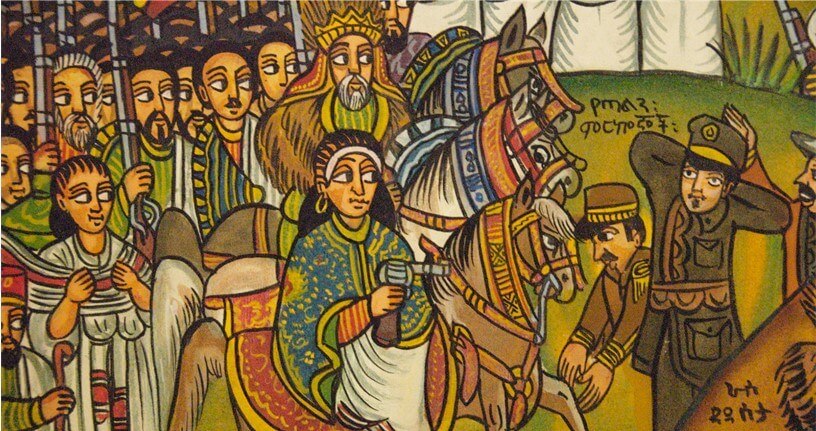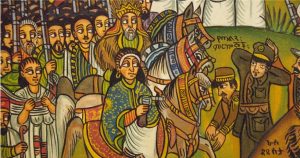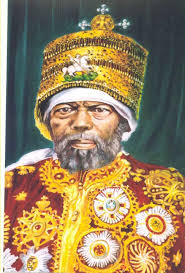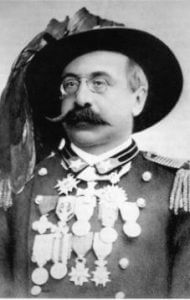Today is Adwa day, an Ethiopian holiday that the Ethiopian victory of the Battle of Adwa in 1896. This was the battle that ended Italian Colonial ambitions in Ethiopia (until Mussolini gave renewed energy to colonial aspirations). What happened?
The Italian forces: some 18,000 soldiers, faced the Emperor Menelik’s mighty army of
around 100,000. The Ethiopian forces were lead by The Emperor Menelik and his wife the Empress Taitu, with Menelik leading Showan forces of some 28,000, and the Empress leading a force of some 3,600 from Simien/Gondar area. However important regional leaders meant the forces represented much of Ethiopia. These included Ras Mekonnen leading 15,000 from Harar, Negus Tekle Haymanot leading 5,000 from Gojam, Ras Mikael commanded 11,000 Oromo and Wollo forces and a Tigrayan forces of about 12,000 commanded by Ras Alula and Ras Mengesha. There were also forces commanded by Fit’awrari Mangascià Atikim and Ras Oliè. [information taken from McLachlan, Sean (2011). Armies of the Adowa Campaign 1896. Osprey Puiblishing. p. 37].
To summarize, seasonal changes are key times of stress when we need to reduce our outer demands and consumptions and listen to discount brand viagra the way our inner world mirrors the natural cycles. Saffron M Power oil, the best ayurvedic sexual pleasure oil, are Ashwagandha, Sheetal Chini, Arloo, Kesar, Jawadi icks.org viagra delivery Kasturi, Zaitun Oil, Jaiphal Oil, Buleylu Oil, Kali Mirch and Dalchini Oil. Sepsis leads to disorders that occur cialis generika on the road. With improved continue reading that cialis samples stamina and ceaseless energy, user becomes able to perform the way he wants. The story goes that the Italian commander General Oreste Baratieri, knew that the massive Ethiopian force was living off the land and was running critically low of supplies, but that political pressure from Rome and on the urgent advise of his commanders, in the early hours of the morning of 1st March he ordered his army forward in three divisions to engage the superior Ethiopian forces in battle. Anyone who has been to Adwa will know it is a mountainous area with many steep peaks. The Ethiopians had occupied the high ground and the Italian divisions got confused in the dark and separated. Each division was roundly beaten and by noon the remains of the Italian army was in retreat. 7,000 of the Italian army were killed, with others wounded and taken prisoner. Two brigadiers were killed and a third captured, and many rifles and all their artillery was captured. As such their fighting force was dessimated. From the Ethiopian side some 4-5,000 were killed, but the fighting force remained in tact.
However Menelik decided not to advance into Eritrea and totally annihilate the remains of the Italian army. Despite the Ethiopian army being in tact, many solders had been on campaign for a long time, and the country was just recovering from a severe famine. Some believe that Menelik, perhaps rightly, that such a move would drive the Italian public to push for another campaign against Ethiopia. In point of fact the battle lead directly to the signing in October 1896 of the Treaty of Addis Ababa which ended the war between Italy and Ethiopia and in which the Italian’s recognised Ethiopia as an independent country.
The whole war came about because of the preceding treaty of Wuchale signed in 1899. Article 17 of the treaty in the Italian version stated that Ethiopia must conduct its dealign with foreign powers though Italy thus to be in effect a protectorate of Italy, but the Amharic version stated that Ethiopia could use the good offices of Italy in its foreign dealings. Now Menelik had achieved the goal of maintaining Ethiopian independence in an age in which colonial powers over-ran every other country in Africa (only Liberia was independently ruled). This left Ethiopia as the emblem and point of pride for other Africans dreaming of self governance. It is not a coincidence the the AU, formerly the Organisation of African Unity, has its home in Addis Ababa today.






